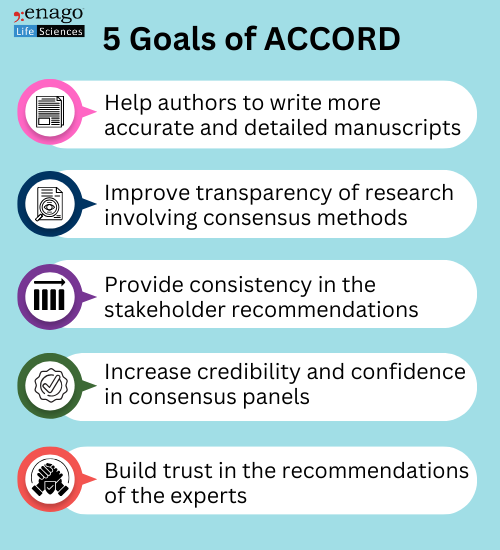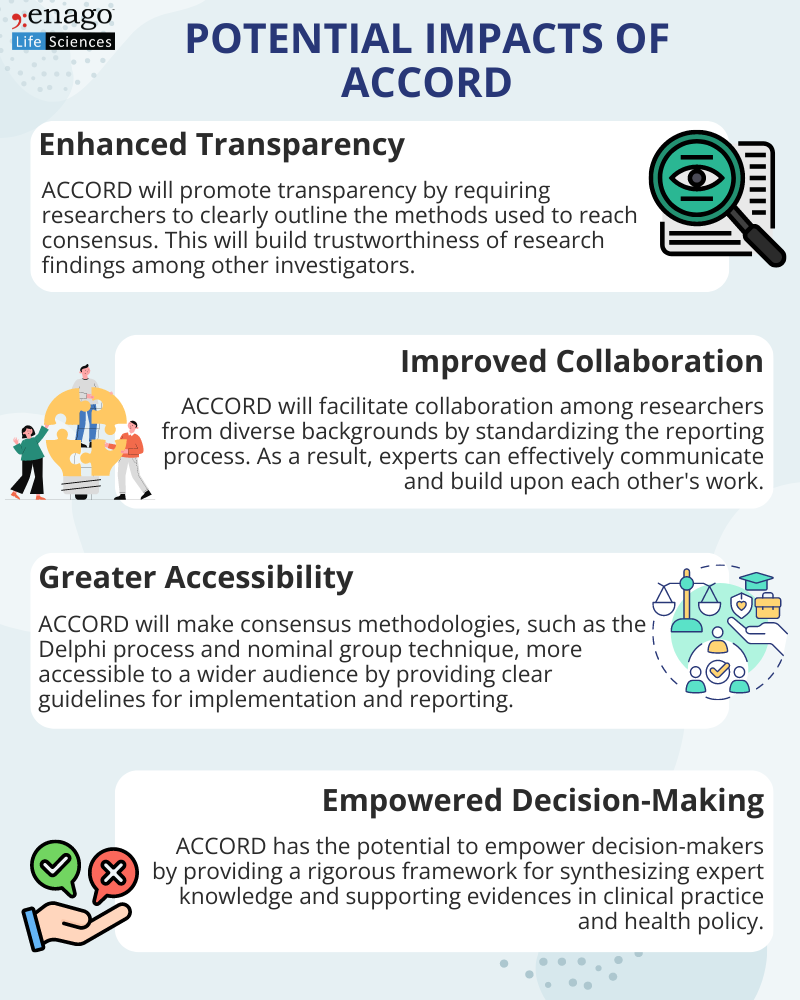Will ACCORD Standardize Consensus Methodology Reporting in Biomedicine? Reviewing the Potential Impact
In the field of medical research, the pressing need for standardized consensus reporting tools cannot be neglected. Furthermore, inconsistent outcomes and lack of standardized reporting practices across studies undermines the reliability and reproducibility of research findings. This not only hinders scientific progress but also impedes informed decision-making in healthcare.
The lack of a standardized consensus reporting poses numerous challenges in disciplines such as clinical trials, epidemiology, etc. In addition to this, healthcare providers and biomedical researchers often face the challenge of making decisions with either insufficient or contradictory information. Although statistical methods can summarize and reconcile the inconsistencies in study findings, consensus methods offer an alternative approach, aiding the analysis of a broader range of dataset. However, inadequate reporting of consensus methods, such as unclear definitions of consensus or lack of transparency regarding panelist selection, can undermine confidence in research and hinder reproducibility.
In order to address these issues and standardize the reporting process, ACCORD – the ACcurate COnsensus Reporting Document has been introduced. It not only support researchers with measuring and reporting outcomes with consistency, but also simplifies the process of reporting evidence, conducting meta-analyses, and deriving meaningful conclusions.
What Is ACCORD?
ACCORD is a new reporting guideline, aimed at improving the transparency and clarity in reporting of consensus methods in biomedical research. ACCORD is the first reporting guideline to be applicable across all consensus methodologies and provides a set of minimum items that should be reported about methods for achieving consensus. The ACCORD checklist was developed through a collaborative process involving experts from various fields, ensuring its relevance and applicability to diverse research contexts. It fills the critical gap in current reporting practices.

Why ACCORD Matters?
The development of ACCORD was spurred by the need of an optimal reporting system of consensus methods. Imagine a scenario: a large team of healthcare experts and biomedical researchers with valuable insights on a crucial problem with limited or inconsistent evidence. Although this provides a range of solutions for the issue, it necessitates consensus among individuals with differing perspectives. Furthermore, the lack of clear reporting standards may result in the risk of their efforts and ideas being lost in ambiguity. Even in cases with abundant evidence, reaching agreement among stakeholders for clinical recommendations, policy decisions, and priority-setting is essential. Furthermore, existing reporting guidelines such as AGREE-II and COS-STAR, while valuable, do not offer comprehensive coverage of all consensus methods.
ACCORD’s strength lies in its systematic development process, which aligns closely with best practices for reporting guidelines, ensuring its robustness and reliability. By adhering to rigorous methodological standards, ACCORD enhances the quality and credibility of the outcome. Furthermore, ACCORD employs a transparent and inclusive approach to consensus-building, involving diverse stakeholders throughout the development process. This inclusive approach ensures that the perspectives and priorities of all relevant stakeholders are considered, enhancing the relevance and applicability of the core outcome sets.
Therefore, ACCORD’s systematic development process aligns with best practices for reporting guidelines. By promoting consensus and standardization in outcome measurement and reporting, ACCORD contributes to advancing evidence-based practice, ultimately improving the quality of research.
The Potential Impact of ACCORD
Although researchers, clinicians, and policymakers have a shared responsibility to uphold the highest standards of rigor in biomedical research, ACCORD represents a significant step in fulfilling this responsibility. Here are some potential impacts of ACCORD in consensus methodology reporting:

Efforts to facilitate ACCORD implementation are underway, with plans for supporting materials and an implementation study. Additionally, improvements in ACCORD are anticipated to accommodate evolving technologies and research methodologies.
Remaining steadfast towards our commitment to knowledge advancement is essential as we embrace this new era of standardized reporting. ACCORD holds immense promise for standardizing consensus methodology reporting in biomedicine. By promoting transparency, enhancing collaboration, and empowering decision-making, ACCORD can revolutionize the way we conduct and communicate research in the biomedical field.
References:
- Gattrell WT;Hungin AP;Price A;Winchester CC;Tovey D;Hughes EL;van Zuuren EJ;Goldman K;Logullo P;Matheis R;Harrison N; “Accord Guideline for Reporting Consensus-Based Methods in Biomedical Research and Clinical Practice: A Study Protocol.” Research integrity and peer review. Accessed March 1, 2024. https://pubmed.ncbi.nlm.nih.gov/35672782/#:~:text=Discussion:%20The%20ACCORD%20reporting%20guideline,gatherings%20to%20highly%20structured%20processes.
- Esther, Amy Price, Ellen L Hughes, Paul Blazey, Christopher C Winchester, et al. 2024. “ACCORD (ACcurate COnsensus Reporting Document): A Reporting Guideline for Consensus Methods in Biomedicine Developed via a Modified Delphi.” PLOS Medicine 21 (1): e1004326–26. https://doi.org/10.1371/journal.pmed.1004326.
- Jones, J. and Hunter, D. (1995). Consensus methods for medical and health services research. BMJ : British Medical Journal, [online] 311(7001), pp.376–380. Available at: https://www.ncbi.nlm.nih.gov/pmc/articles/PMC2550437/.
- Gattrell, W.T., Logullo, P., Esther, Price, A., Hughes, E.L., Blazey, P., Winchester, C.C., Tovey, D., Goldman, K., Amrit Pali Hungin and Harrison, N. (2024). ACCORD (ACcurate COnsensus Reporting Document): A reporting guideline for consensus methods in biomedicine developed via a modified Delphi. PLOS Medicine, 21(1), pp.e1004326–e1004326. doi:https://doi.org/10.1371/journal.pmed.1004326.


This is testing Comment.
Testing blog Comment
testing
“Loved this article!”
Hey very interesting blog!
I wanted to thank you for this very good read!!
I definitely loved every bit of it. I have you
book marked to check out new stuff you post…
Whoa! This blog looks exactly like my old one!
It’s on a completely different subject but it has pretty much the same layout and
design. Superb choice of colors!
I was suggested this web site by way of my cousin. I am not
positive whether this publish is written through him as nobody else understand such unique approximately my trouble.
You’re amazing! Thank you!
Hi everyone, it’s my first visit at this web page,
and piece of writing is really fruitful designed for me, keep up posting these articles.
I love your blog.. very nice colors & theme. Did you
make this website yourself or did you hire
someone to do it for you? Plz respond as I’m looking to construct my
own blog and would like to know where u got this from. thanks a lot
I am really happy to read this website posts which consists
of lots of helpful facts, thanks for providing these kinds of statistics.
If some one wishes expert view regarding running a blog
afterward i propose him/her to pay a quick visit this
blog, Keep up the pleasant job.
Having read this I believed it was extremely informative.
I appreciate you finding the time and energy to put this content together.
I once again find myself spending way too much time both reading
and commenting. But so what, it was still worth it!
I’ve learn a few good stuff here. Definitely value bookmarking for revisiting.
I wonder how so much attempt you put to create this sort of fantastic informative website.
Pretty nice post. I simply stumbled upon your blog and wished to say that I’ve really loved surfing around your weblog posts.
After all I will be subscribing to your rss feed and I am
hoping you write again very soon!
Thanks for finally writing about > Will ACCORD Standardize Consensus Methodology
Reporting in Biomedicine | Enago Lifesciences Blog
< Loved it!
Its like you read my mind! You seem to know so
much about this, like you wrote the book in it or something.
I think that you can do with some pics to drive the
message home a little bit, but other than that,
this is wonderful blog. A fantastic read. I will definitely be back.
Asking questions are truly fastidious thing if you are
not understanding anything totally, but this piece of writing gives good understanding even.
It’s hard to find well-informed people in this particular subject,
but you sound like you know what you’re talking about!
Thanks
Hi there colleagues, its great piece of writing regarding
educationand completely defined, keep it up all the time.
Very quickly this site will be famous among all blog people, due to it’s good articles